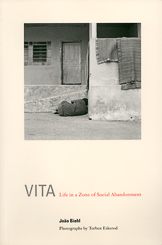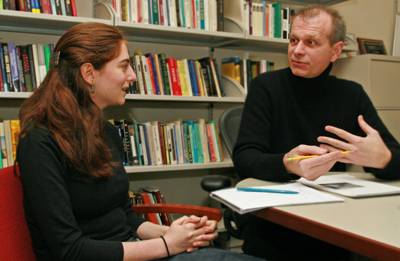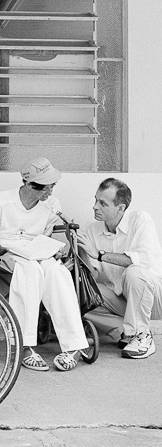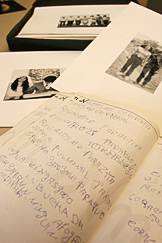While doing fieldwork for his Ph.D. in his native Brazil in 1995, anthropologist João Biehl was taken on a detour by a local activist who told him there was a place he "just had to see."
That place was Vita, a site in Porto Alegre not far from where Biehl grew up, that is populated by the sick, mentally ill and poor who have passed beyond the care of families and social institutions. Vita is a place where individuals are left behind in what Biehl calls a "zone of social abandonment."
"The first time I went to Vita I was incredibly moved by its desolation but also by the fact that this was a place of abandonment in the middle of a city known for its progressive politics," said Biehl. "Hospitals and the police dumped people there, and I started to think that Vita was not an exception but was part of something that was publicly sanctioned."
In 1997, Biehl visited Vita again, and this time met Catarina, a young woman who was becoming increasingly paralyzed and was considered by her family and various doctors to be insane. With no one to look after her, she had ended up at Vita.
For Biehl, getting to know Catarina and Vita's other inhabitants profoundly shaped who he is today and galvanized his work as a researcher and a teacher. A faculty member at Princeton since 2001, Biehl sees himself as a "public anthropologist" who has a responsibility to "make a difference in how people think about their problems," and to share the knowledge he gains.
Biehl wrote about his experiences in "Vita: Life in a Zone of Social Abandonment," which revolves around an ethnographic study of Catarina, who died in Vita in 2003. It also offers a close look at the workings of Vita itself as a poorly funded and ungoverned place of last resort. According to Biehl, places like Vita are emerging everywhere in urban Brazil, and the book shows "how economic globalization and state and medical reform coincide and impinge on a local production of social death."

The book, which includes photographs of Vita's residents by the Danish photographer Torben Eskerod, was published by the University of California Press in 2005 and has garnered five major awards from a range of organizations, including the Eileen Basker Memorial Prize from the Society for Medical Anthropology, the Stirling Prize from the Society for Psychological Anthropology and the Outstanding Book Award from the Benjamin L. Hooks Institute for Social Change.
Describing the impact of the book, Princeton anthropologist Carolyn Rouse said, "In addressing social policy and ethics, 'Vita' demonstrates how one person's life can be a basis for thinking about complex issues."
Patricia Fernández-Kelly, who teaches "Vita" in her urban sociology course at Princeton, said that while the book "focuses on a Brazilian city, its lessons transcend national boundaries — it is as meaningful in the United States as it would be in Turkey." She explained that "the reader is led into a world of market forces, inefficient bureaucracies and decomposing family ties in which no one and everyone is responsible for Catarina's fate."
Biehl's next book, "Will to Live: AIDS Therapies and the Politics of Survival," also reflects his engagement with the world. Forthcoming from Princeton University Press in the fall, the book tells how Brazil became the first developing country to universalize access to life-saving AIDS therapies — a breakthrough that Biehl says was made possible through an "unexpected alliance of activists, government reformers, development agencies and the pharmaceutical industry."
But Biehl also explains why this policy, hailed as a model worldwide, has been so difficult to implement in urban-poor contexts. At the core of "Will to Live" is a group of unemployed and homeless AIDS patients who on their own established a makeshift health service. Biehl chronicled their lives for more than 10 years; they are represented in the book in more than 100 photographs by Eskerod.
Searching for the truth
Currently an associate professor of anthropology at Princeton, Biehl received degrees in religion, journalism and philosophy from institutions in Brazil. He earned a Ph.D. in religion from the Graduate Theological Union in Berkeley in 1996 and a Ph.D. in anthropology from the University of California-Berkeley in 1999. From 1998 to 2000, he was a National Institute of Mental Health Postdoctoral Fellow at Harvard University.
Biehl's interests include medical anthropology, social studies of science and technology, and globalization and development. He explores how the lives of individuals — and their illnesses — can be understood by their cultural, socio-political and economic environments. His ethnography reveals how medicine cannot be fully effective without the benefit of strong societal networks, even while, he attests, "the perspective of public health is shifting from prevention toward magic-bullet pharmaceuticalization."
In his research, Biehl often proceeds like a detective, finding clues and gathering evidence to help him understand the reality of what he is investigating. This approach was crucial in gaining an understanding of Catarina's life, since at Vita she was drastically cut off from her past and, ill and overmedicated, could barely communicate.
When Biehl first met Catarina, she was struggling to write, impeded by her increasing paralysis. He recalls that she asked him for a pen so that she could complete the word "contact." It was a singular moment for Biehl, who saw that "there was a world asking to be understood; it was the world of her words."
Working with Catarina taught Biehl anthropology in a new way. "It drew the best out of me in so many instances," he said. "I love anthropology's relentless empiricism and its openness to theories. But anthropology needs to develop a listening capacity and to engage in an activist way, to become involved with the problem, not just to observe it from a distance."
Over time, Catarina's writings filled 21 notebooks, providing a kind of "dictionary" to her life. Biehl keeps one of the notebooks in his office in Burr Hall; it is a thin volume with flimsy pages marked with shakily written words in Portuguese and a few simple drawings.
Through the clues in Catarina's written words and from his conversations with her, Biehl discovered the threads of her life, but he had to do a great deal of fact-finding on his own.
He learned about her past: Catarina had been married, had siblings nearby and was the mother of three children. As her illness progressed and her marriage disintegrated, her eldest two children went to her husband's family, and her youngest daughter was given up for adoption. During repeat visits to Vita over 10 years, Biehl sought out many of these family members, and heard their perspectives on why Catarina had become too much of a burden for them, a history tangled by the complications of disease, poverty and fear.
Exploring Catarina's references to her medications and hospitalizations, Biehl researched the history of her failing health and uncovered an unknown truth. Instead of suffering from a mental illness that needed treatment from a variety of mind-altering drugs, Catarina actually suffered from a rare neurodegenerative disorder — Machado-Joseph disease — that caused her to lose her ability to walk and, over time, shut her down. It was an illness that had afflicted Catarina's mother, and, as in her case, also presented itself after childbirth.
Reaching this diagnosis took Biehl through a maze of medical hoops. He found out what drugs Catarina was taking at Vita and had taken previously — anti-depressants and anti-psychotics that were irregularly prescribed; he spoke to doctors and public health officials who had hospitalized her; and as the picture of her illness became clearer, he took her to a geneticist and neurologist who finally made the correct diagnosis and provided the best possible care. By the time of Catarina's death, her brothers also were experiencing symptoms of the disease. Biehl still keeps in contact with them.

Teaching the real
Biehl's students readily respond to his close human engagement and message of possibility and to his example of charting larger societal concerns through individual trajectories.
In 2005, Biehl was honored at Commencement with a President's Award for Distinguished Teaching. In the nomination materials submitted by students, who responded deeply to his commitment to humanity, he was lauded as a "virtuoso of teaching" who offered an "unwavering ethical stance."
Senior Irit Rasooly, an anthropology major, said Biehl "constantly reminds me not to lose sight of 'the story.'" She added, "Ultimately, it is his attention to the narrative that allows him to humanize and complicate understandings of illness in such a powerful way."
Rasooly is using the final paper she wrote for Biehl's medical anthropology class as the foundation for her senior thesis. She is studying access to healthy foods in Baltimore's inner city, based on research she did this past summer working with the Baltimore Healthy Stores Project. "The severe lack of access to healthy foods is an important factor in understanding obesity in that neighborhood," she said. This December, she returned to East Baltimore to conduct ethnographic interviews of residents regarding their perceptions of access to such foods.
"Students love ethnographic materials," said Biehl. "They have a thirst for reality." He recalls that when he was going back and forth to Vita, the undergraduates in his medical anthropology class helped him analyze Catarina's "sea of words" in her notebooks.
In his work with students, especially graduate students who traverse the world for their research, Biehl asks that they "move beyond public discourse and the first story people tell you and into domestic spaces" — such as people's homes — to "try to identify the constellations in which life chances are forged and how the inner and outer world are sutured together."
One of Biehl's first assignments that always opens the eyes of undergraduates to key issues of medical anthropology is when he asks them to write an "illness narrative" of a family member who has undergone a medical event or treatment. "I want them to trace those statements to medical practices and institutions," he said.
Later in the course, students study how diseases can affect larger populations, and the interventions — medical and political — used to address them. Students also have the opportunity to pursue a project that connects them to real-world issues, developed in association with the Community-Based Learning Initiative at Princeton.
For example, sophomore Joyce Lee collaborated with three classmates in a project for Homefront, an organization that addresses homelessness in Trenton. The students researched programs and policies that may prove beneficial for Homefront in their efforts to assist homeless mothers with mental illnesses.
Lee said that a highlight of Biehl's course was "the way it exposes society's assumptions about the meaning and role of medicine." An electrical engineering major, she added that it's "important for scientists to be socially aware of the potential impact that their work may have, whether or not they choose to work in biomedical science or any other field. "
Matthew Goldberg, a member of the class of 2004 who majored in anthropology, is now a medical student whose interests were sparked by Biehl's work with Catarina. After he graduated, he went on a Fulbright fellowship to Brazil to learn more about Machado-Joseph patients and worked closely with the same physician who diagnosed the condition in Catarina.
"This project gave me unique access to conduct social science research in a clinical setting and to bridge my past experience in the anthropology of collective health services and my future course as a medical student," he said.
Biehl is emphatic that uncovering the stories of the sick and unwanted is not a draining task emotionally, but one that speaks to a "life force." He thinks of the AIDS survivors he has come to know, and Catarina, and he thinks of their children. Already his next long-term project is under way — to follow up on these children in Brazil and to write an account of their lives.
"It is the biggest challenge to understand how one person's life is shaped," he said.



